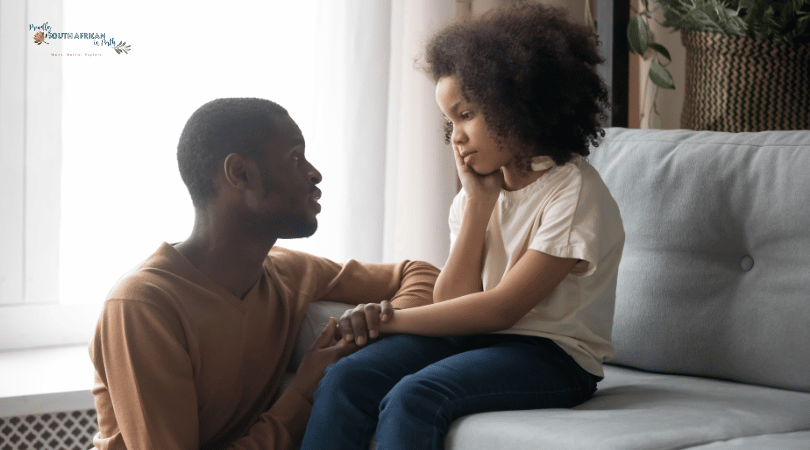Are you wondering how to tell your children you are emigrating?
Emigration can be one of the most daunting decisions you will make for the future of your family, especially when it involves breaking the news to your children. As a parent, you want to ensure that the transition is as smooth as possible for your kids, minimising any feelings of sadness, confusion or anxiety they may have along the way.
Here’s my guide on how to approach this delicate conversation, to help you break the news gently and positively.
My Tips On How To Tell Your Children You Are Emigrating
Tell Them Early
One of the most crucial pieces of advice I can offer is to tell your children about the upcoming move as early as possible.
Keeping it a secret until the last minute can lead to big feelings like betrayal, anxiety and insecurity.
By giving them ample time to process the news, you allow them to adjust to the idea gradually and at their own pace.
You might want to shield them from it until it becomes official, for example once you have your visa or have been offered employment. Some parents do this so they don’t stress their kids out when it may not even happen, which is totally understandable. But on the other hand, getting them involved, interested and on board with the process as early as possible can help them feel more positivity and excitement rather than worried and sad.
Use Age-Appropriate Language
When breaking the news, tailor your language to suit the age of your children. Obviously, it will depend on your child’s age as to how you tell them and how much detail you go into when you tell them.
Younger kids may need simpler explanations, while older ones might appreciate more detailed discussions.
Regardless of age, reassure them that you will be there to support them every step of the way.
Explain Why You Are Emigrating
Children are naturally curious, so be prepared to answer their potentially infinite questions about why you’re moving.
Older children may have more complex questions than the little ones, so be prepared for what they may ask you. They will likely want to know why you want to move overseas and a timeline for how long the process will take. Although we all know that sometimes it’s the toddlers who bring out the big and unexpected questions!
Explain the reasons behind the decision to emigrate in a way that they can understand, emphasising the positive aspects of the move. For instance, if you’re moving to Australia, you could highlight the opportunities for adventure, new experiences, a safer environment, and an overall better quality of life.
Include Them In Every Step Of The Process
Make your children feel like active participants in the emigration process by involving them in the timelines and decision-making whenever possible.
Allow them to have a say in matters such as choosing what to pack or what they’d like in their new home (most might say a swimming pool or cinema room!). If the children are a little older, allowing them to help choose a school could help them settle in to a new educational setting quicker too. Obviously, you would ensure any decisions they get to make are age-appropriate as well.
By making them part of the process and decision-making, this not only empowers them but also helps them feel more positively invested in the move.
Celebrate The Milestones
Moving to a new country is a significant event for the entire family, so be sure to celebrate it as such.
Celebrate every milestone when it happens – such as when you receive your visas, get job offers, or book your flights.
Organise a farewell party with friends and family to reminisce about the good times and create lasting memories.
Similarly, once you’ve arrived in your new home, mark the occasion with a special celebration to kickstart this exciting chapter in your lives. It could be something as simple as a toast with your favourite drinks and snacks, or watching the sunset on your first night in your new country.
Be Honest With Them
Honesty is key when discussing the move with your children.
Acknowledge their concerns and fears, and reassure them that it’s normal to feel apprehensive about such a big change. Be open about the challenges you may face as a family, but also highlight the strength and resilience you possess to overcome them together.
Use Google Maps & Street View
This is something I spent hours on – for me mostly as my son was only 2 when we were in the middle of planning the move – in advance of our move to Australia in 2013.
To help your children visualise their new surroundings, use tools like Google Maps and Street View. Explore the streets of your future neighbourhood together, pointing out places of interest and potential spots to add to your first-year bucket list.
This can help alleviate some of their anxiety about the unknown and at the same time foster genuine excitement about their new country.
Immerse Them In Their New Culture
Before the move, take steps to immerse your children in the culture of your new country. Introduce them to its customs, traditions, and even language if applicable. This can help ease the transition and make them feel more at home once you’ve arrived.
When we were planning our move to Australia, I could not get enough of all things Australian. I watched any TV show under the sun that was vaguely related to Australia. I binged the BBC documentary Wanted Down Under. I lived for Masterchef Australia. I made a CD (yes back in the days when you went to the effort of making CDs!) of my favourite Australian songs which was on repeat while I was driving around cold and wintery England.
For young kids, there are heaps of cartoons and shows online that would be appropriate – and Bluey has made it even easier for parents moving to Australia now. There are also heaps of videos on YouTube – you can find something interesting and age appropriate from just about any country for your kids on there. For example, if they’re into skate boarding, find a skate boarding YouTuber in Australia they could follow.
There are also countless movies about Australia, or set in Australia, you can watch with your kids – many are family friendly. Or read some books about Australia, Australian animals, and Australian life together – books are still one of the best ways to engage children in anything new and unfamiliar. I’m planning a blog post about books to help your kids with the move to Australia soon, so will come back and link here when it’s published.
I hope you find these tips on how to tell your children you are emigrating helpful when the time comes for you to tell your children.
Always remember that breaking the news of an upcoming move abroad to your children requires sensitivity, honesty, and plenty of reassurance. By following these tips and approaching the conversation with empathy, you can help your children embrace this new adventure with open hearts and open minds. Remember, while the journey may have its challenges, the bonds of family will always be a source of strength and support.
If you’ve been through this already, share your tips and insights in the comments below.






No Comments